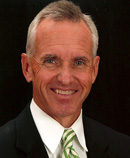Fifty years ago this week, a black pastor from the South stood in front of the Lincoln Memorial and delivered the gold standard of social and political oratory.
I wish we could say Martin Luther King Jr.’s “I Have a Dream” speech became the most important and effective political proclamation of all time, or at least in our nation’s history. But we cannot say that, because it’s not true. At least not yet. Reticence does not reflect Dr. King’s vision and eloquence. Rather, it reflects our nation’s moral timidity, fear and greed.
 Editor Marv KnoxOften imitated, never duplicated, Dr. King’s speech moved millions of Americans with its power, poignancy and passion. It articulated the aspirations of Americans who did not enjoy the promises of our founding fathers’ principles.
Editor Marv KnoxOften imitated, never duplicated, Dr. King’s speech moved millions of Americans with its power, poignancy and passion. It articulated the aspirations of Americans who did not enjoy the promises of our founding fathers’ principles.
“In a sense, we have come to our nation’s capital to cash a check,” King told 250,000 participants in the March on Washington for Jobs and Freedom. “When the architects of our republic wrote the magnificent words of the Constitution and the Declaration of Independence, they were signing a promissory note to which every American was to fall heir. This note was a promise that all men would be guaranteed the inalienable rights of life, liberty and the pursuit of happiness.
“It is obvious today that America has defaulted on this promissory note insofar as her citizens of color are concerned. Instead of honoring this sacred obligation, America has given the Negro people a bad check which has come back marked ‘insufficient funds.’”
After Birmingham
King spoke three months after horrified Americans tuned in to the evening news and watched police in Birmingham, Ala., turn attack dogs and fire hoses on women and children who protested for integration. He spoke in the shadow of bus boycotts, lunch-counter sit-ins and Freedom Rides—all peaceful protests to lift the yoke of injustice.
Indeed, even as King spoke, more than two-thirds of African-Americans lacked the right to vote, attend integrated schools and use the same water fountains, restrooms and other public facilities as white people, according to USA Today.
King began his speech as most African-American preachers launch their sermons—slowly, deliberately. His prepared text included the line, “I have a dream,” which he had spoken before, at least in Chicago and Detroit.
Well into the speech, Mahalia Jackson, a gospel singer and King’s good friend, called out to him: “Tell ’em about the dream, Martin. Tell ’em about the dream.”
Departing from the text
That’s when King departed from his text and told the world about “the dream”—King’s dream, of course, but also the dream of African-Americans and others who envision true liberty and equality.
“I say to you today, my friends, that in spite of the difficulties and frustrations of the moment, I still have a dream. It is a dream deeply rooted in the American dream,” King said. “I have a dream that one day this nation will rise up and live out the true meaning of its creed: ‘We hold these truths to be self-evident: That all men are created equal.’
“I have a dream that one day on the red hills of Georgia the sons of former slaves and the sons of former slave owners will be able to sit down together at a table of brotherhood. … I have a dream that my four children will one day live in a nation where they will not be judged by the color of their skin but by the content of their character. …
“This is our hope. This is the faith with which I return to the South. With this faith, we will be able to hew out of the mountain of despair a stone of hope. With this faith, we will be able to transform the jangling discords of our nation into a beautiful symphony of brotherhood. With this faith, we will be able to work together, to pray together, to struggle together, to go to jail together, to stand up for freedom together, knowing that we will be free one day. …
“And when this happens, when we allow freedom to ring, when we let it ring from every village and every hamlet, from every state and every city, we will be able to speed up that day when all of God’s children, black men and white men, Jews and Gentiles, Protestants and Catholics, will be able to join hands and sing in the words of the old Negro spiritual, ‘Free at last! Free at last! Thank God Almighty, we are free at last!’”
King’s dream inspired African-Americans and awakened millions of middle-class whites. The next year, Congress passed the Civil Rights Act of 1964, and the year after that, the Voting Rights Act of 1965 became law. Schools integrated. Forty-five years later, Americans elected an African-American president.
But don’t be confused. Dr. King’s dream has not been fulfilled.
A dream still deferred
Just this summer, the George Zimmerman trial reminded Americans of the pungent fear that leads to racial profiling and resulted in the death of an African-American teenager, Trayvon Martin.
An even more craven and calculating fear pressed the Supreme Court to undermine the Voting Rights Act and—in moves that confirm the justices’ myopic failure—propelled states to enact practices that once again curtail minorities’ access to the ballot. To our shame, Texas is among them.
If you pay even the slightest attention, you realize race is an underlying theme of strikes and other protests by fast-food workers. Far too many jobs do not pay a wage sufficient to raise a family, mocking the “American dream.”
To be sure, racial liberty and equality is one of the thorniest issues of this and any age. Responsibility lies with all parties. But as long as racial injustice exists—and any reasonable person must recognize its existence among not only African-Americans, but also Hispanic-Americans and other people of color—we all must press for liberty, equality, freedom.
Otherwise, Dr. King’s hallowed dream will remain deferred.
 David HardageI want to thank those of you who helped financially and spiritually support the work of our Baptist Student Ministries summer missionaries. They have served the Lord and Texas Baptists well. Now, join me in praying that this good work on our Texas college and university campuses continues strong during this fall semester.
David HardageI want to thank those of you who helped financially and spiritually support the work of our Baptist Student Ministries summer missionaries. They have served the Lord and Texas Baptists well. Now, join me in praying that this good work on our Texas college and university campuses continues strong during this fall semester.


 That was a good idea. Those committees help the Executive Board do its basic, day-in and day-out work. When their descriptions were included in the bylaws, they could be changed only by vote of the convention in annual session. The Executive Board needed authority to tend to its internal committees directly and promptly.
That was a good idea. Those committees help the Executive Board do its basic, day-in and day-out work. When their descriptions were included in the bylaws, they could be changed only by vote of the convention in annual session. The Executive Board needed authority to tend to its internal committees directly and promptly.
